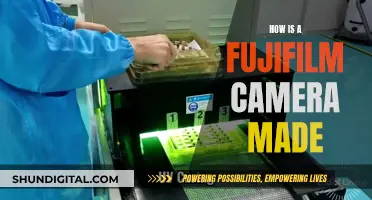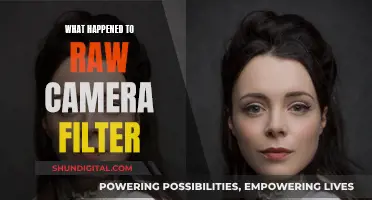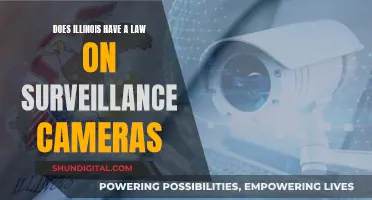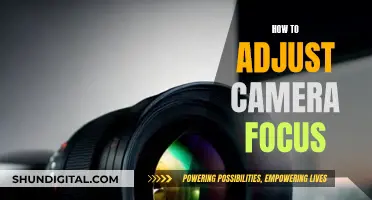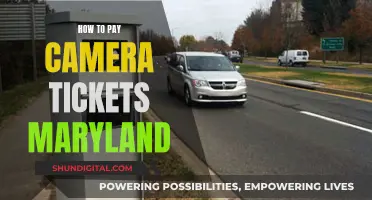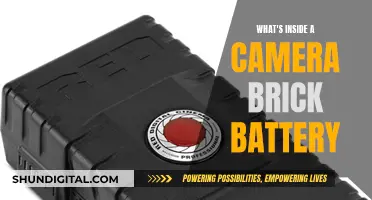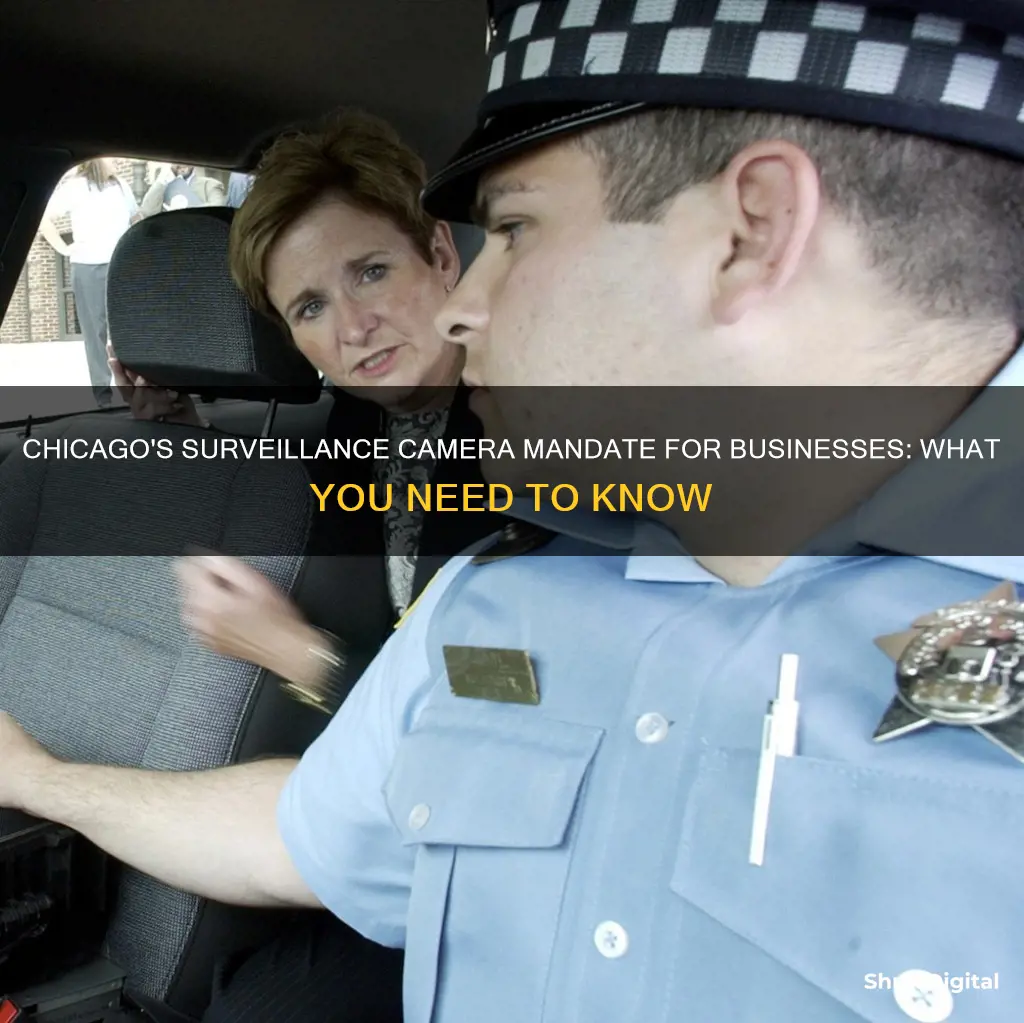
Chicago has a high crime rate, with violent crime 164% higher than the national average, and property crime 45% higher. In response, the city has implemented a vast network of surveillance cameras, with 10,000-20,000 public and private-owned cameras accessible to the city's control centre. The city also encourages businesses and residents to install cameras on their premises, offering reimbursements of up to $225 per camera. While Chicago has a large number of cameras, there are strict laws regarding where they can be placed and how footage can be used.
| Characteristics | Values |
|---|---|
| Surveillance laws in Chicago | Differ from surveillance laws in other states |
| Surveillance in workplaces | Legal, but the reason for monitoring must be important enough for the company |
| Surveillance in private residences | Prohibited without the resident's consent |
| Surveillance in public spaces | Legal, but with some restrictions on the use of the data |
| Surveillance in banks, restaurants, retail stores, and other public-facing establishments | Required for security and theft prevention |
| Surveillance in locker rooms, bathrooms, and other private areas | Prohibited |
| Surveillance camera installation requirements | Must be licensed and registered with the state |
| Surveillance camera usage | Must comply with state and federal statutes, including privacy and data protection laws |
| Surveillance camera reimbursement | Up to $225 per camera (cost of camera and tax only) for a maximum of 2 cameras, or a total $450 reimbursement |
What You'll Learn

Chicago's Home and Business Protection Program (HBPP)
Program Details
HBPP offers rebates of up to $225 per camera for a maximum of two cameras, or a total reimbursement of $450. It also offers to cover the costs of cloud-based video storage systems, providing up to $150 per annual subscription. Additionally, the program provides rebates for outdoor motion sensor lighting, offering up to $100 per light for a maximum reimbursement of $200. For vehicle security, the program includes rebates of up to $50 per GPS tracking device, with a maximum reimbursement of $100 for two devices.
Eligibility and Requirements
To be eligible for the HBPP rebates, applicants must be owners or tenants of a property used as a primary residence, business, religious institution, or nonprofit organization within Chicago. Alternatively, they must own or lease a vehicle registered to a primary address within the city.
To receive reimbursement, applicants need to provide documentation verifying proof of purchase and photo documentation confirming the installation of the security equipment. It is important to note that only security devices purchased on or after the specified date, which was June 6, 2022, for the initial launch, qualify for reimbursement. Installation costs for cameras, lighting, and GPS tracking devices are not covered by the program.
The program is open to all Chicago residents and business owners on a first-come, first-served basis. In addition to the general program, an Income-Based application was introduced to remove economic barriers and provide security devices to a wider range of city residents. Eligibility for this portion of the program is determined based on the level of income per household.
Benefits of the Program
The HBPP not only helps Chicago residents and businesses enhance their security measures but also provides valuable support to law enforcement. By registering their camera systems, participants can aid the Chicago Police Department in crime investigations, allowing detectives to solve crimes more efficiently and quickly bring violent offenders to justice.
The program also addresses privacy concerns by ensuring that camera operators respect individuals' reasonable expectations of privacy. This means that cameras should not be oriented towards areas where privacy is expected, such as personal residences, restrooms, locker rooms, and other private spaces.
Community Impact
During its operation from June 2022 to April 2023, the HBPP Rebate program issued more than 5,300 checks, totaling close to $1.9 million. This included the distribution of over 650 device kits to residents through the Income-Based portion of the program. With its comprehensive approach, Chicago's Home and Business Protection Program has made a significant impact on strengthening security and protecting the welfare of the city's residents and businesses.
The Intricate Art of Crafting Camera Lenses
You may want to see also

Video surveillance laws in Illinois
Surveillance in the Workplace
Illinois's workplace surveillance laws allow employers to monitor almost everything an employee does at work, as long as there is a legitimate business reason for doing so. This includes the use of video cameras, reading mail and emails, tracking phone and computer usage, and using GPS tracking, among other methods. However, the justification for a particular type of workplace video monitoring must outweigh the employee's expectation of privacy. For example, while it is unlikely that an employer would monitor a locker room, it is reasonable to install security cameras in a call center.
Surveillance in Public Spaces
Video surveillance is required in banks, restaurants, retail stores, and other public-facing establishments for security and theft prevention. Employees in these settings do not have a reasonable expectation of privacy. Security cameras in high-traffic areas can deter theft and criminal activity and foster a sense of safety.
Surveillance in Private Spaces
Illinois law prohibits the unauthorized recording or live streaming of individuals without their consent in various private settings. It is unlawful to knowingly create video, audio recording, or live-stream footage of another person in places like restrooms, tanning beds, tanning salons, locker rooms, laundry facilities, changing rooms, or hotel bedrooms without obtaining that person's consent. This prohibition extends to the recording of another person within their residence, including rental dwellings, without their consent.
Surveillance in Residential Areas
The use of security cameras pointed at another person's residence is not illegal, as long as the camera is only recording what can be seen from a static position. However, it is illegal to use a device that records or transmits audio or video footage from a remote location without the consent of all parties.
Licensing Requirements
In Illinois, individuals or companies engaged in installing and maintaining security systems are required to obtain a license. Licensed contractors provide expert installation, ensure safety, and offer warranties for their work. Obtaining a license helps ensure proper camera placement, enhances security, and complies with legal requirements.
Important Considerations
- Illinois is an All-Party Consent State, which means that all people involved in a recorded communication must give permission.
- It is unlawful to intentionally transmit live video or record video footage of another person without their consent in any place where there is a reasonable expectation of privacy.
- The Protecting Household Privacy Act, implemented in 2021, restricts device data sharing by requiring a search warrant or consent from the device owner, except in emergencies.
- The Federal Wiretapping Act applies to audio captured by surveillance cameras, and hidden cameras can be used to record private conversations.
- While not required, it is considered good security practice to display signs indicating that an area is under surveillance.
Cameras Beyond China: Exploring Alternative Manufacturing Hubs
You may want to see also

Workplace surveillance laws in Illinois
Illinois has specific requirements regarding security cameras and video surveillance. It is important to learn about Illinois laws and regulations before installing or upgrading a security system.
Privacy in the Workplace
Illinois Compiled Statutes include the Right to Privacy in the Workplace Act. This prohibits employers from refusing to hire or discharging any individual, or otherwise disadvantaging them, because they use lawful products off the employer's premises during non-working and non-call hours.
Surveillance in the Workplace
However, the justification for a particular type of workplace video monitoring must be more important than an employee's expectation of privacy for it to be legal. For example, an employer would be unlikely to monitor a locker room but would be allowed to install security cameras in a call center to watch activities.
Consent for Recording
Illinois is an All-Party Consent State, which means that all people involved in a recorded communication must give permission. It is unlawful to knowingly transmit live video or record video footage of another person without that person's consent in any place where a person has a reasonable expectation of privacy, such as a changing room or hotel room.
Surveillance Devices
It is illegal to knowingly install, use, or maintain an optical surveillance device to visually record or observe the conduct of an activity. The maximum penalty is 100 penalty units or five years in prison, or both.
Surveillance in Private Settings
It is unlawful to knowingly create a video, audio recording, or live stream video of another person in private settings such as restrooms, tanning beds, tanning salons, locker rooms, laundry facilities, changing rooms, or hotel bedrooms without obtaining that person's consent. This prohibition extends to outside the person's residence if a recording device is used that transmits from a remote location.
Surveillance in Residences
It is unlawful to knowingly transmit live video or record video footage of another person without that person's consent in their residence, including a rental dwelling.
Surveillance and the Federal Wiretapping Act
The Federal Wiretapping Act applies to audio captured by surveillance cameras. Hidden cameras and recording devices can be used to record a private conversation, but only if a crime is committed against someone in your household or against you.
Surveillance and Licensing
In Illinois, individuals or companies that install and maintain security systems are required to obtain a license. Obtaining a license ensures expert installation, safety, provides recourse if things go wrong, and offers protection against mishaps.
How Diopter Adjustment Affects Camera Autofocus Performance
You may want to see also

Surveillance cameras and privacy laws
The Use of Surveillance Cameras in Chicago
Surveillance cameras are prevalent in Chicago, with the city boasting between 10,000 and 50,000 public and private security cameras. The city's government has implemented this extensive network of cameras as an initiative to enhance safety and create quick alert systems. Chicago's Office of Emergency Management (OEMC) operates this video monitoring system, which includes cameras on public transportation and in schools, airports, and housing authorities. The city's 911 Center, or OEMC, is responsible for monitoring these cameras, and Chicago police can also access and control them remotely.
Privacy Laws and Considerations
While the use of surveillance cameras in Chicago has raised privacy concerns, there are laws and regulations in place to protect individuals' privacy. Here are some key considerations:
- Consent and Private Spaces: In Illinois, it is unlawful to knowingly create video, audio, or livestream recordings of individuals without their consent in private spaces such as restrooms, tanning beds, locker rooms, hotel rooms, and residences. This includes transmitting live video or audio from a remote location.
- All-Party Consent: Illinois is an All-Party Consent state, meaning that all individuals involved in a recorded communication must give permission. This applies to both video and audio recordings.
- Federal Wiretap Act and Eavesdropping Law: It is illegal to record another person without their consent, even in public places, as it violates the Federal Wiretap Act and/or the Illinois Eavesdropping Law.
- Reasonable Expectation of Privacy: Individuals have a reasonable expectation of privacy in certain places, such as changing rooms and hotel rooms. Cameras should not be oriented toward areas where privacy is expected.
- Data Storage and Privacy Policies: There should be clear privacy policies governing the collection and storage of footage. Data should not be stored indefinitely unless related to an ongoing investigation.
- Precautionary Measures: Chicago should implement additional safeguards, such as annual audits of the camera system to analyze its effectiveness, privacy impact, and potential misuse. The city should also encourage public participation and feedback before installing new cameras.
In conclusion, while Chicago heavily relies on surveillance cameras for security and quick alert systems, it is crucial to balance this with individuals' privacy rights. The city has taken some steps to address privacy concerns, but there are still ongoing discussions and proposals for further regulations to protect citizens' privacy.
The Brownie Hawkeye Camera: Bakelite Body?
You may want to see also

The legality of security cameras in Chicago
The use of security cameras in Chicago is lawful, and they are widely recognised as a necessary tool to protect people and property. However, there are strict laws surrounding their use, and failure to comply can result in serious legal consequences.
Public vs Private Spaces
In Chicago, security cameras are prevalent in public spaces. The city government has installed thousands of cameras in public spaces, and there are a further 10,000 to 20,000 private security cameras that the city can access. This means that virtually every stretch of the public road in downtown Chicago is under 24/7 camera surveillance.
In private spaces, such as businesses, security cameras are also common. Video surveillance is required in banks, restaurants, retail stores, and other public-facing establishments for security and theft prevention.
Privacy Laws
While security cameras are legal, there are strict privacy laws that govern their use. In Chicago, it is illegal to record another person without their agreement, even in public places. This is a violation of the Federal Wiretap Act and/or the Il Eavesdropping Law. Therefore, cameras should not be oriented towards any area where there is a reasonable expectation of privacy, such as personal residences, restrooms, locker rooms, and changing rooms.
Consent Laws
Illinois is an all-party consent state, which means that all people involved in a recorded communication must give permission. It is unlawful to knowingly transmit or record video or audio of another person in their residence without their consent. This includes rental dwellings but does not include common areas such as stairwells and corridors.
Workplace Surveillance
Workplace surveillance laws in Illinois allow employers to monitor almost everything an employee does at work, as long as there is a legitimate business reason for doing so. Employers must have a good reason for any type of workplace video monitoring, and it must outweigh the employee's expectation of privacy. For example, an employer would likely be permitted to install security cameras in a call centre but not in a locker room.
Licensing Requirements
In Illinois, individuals or companies that install and maintain security systems are required to obtain a license. Working with a licensed contractor ensures expert installation, safety, recourse if issues arise, and protection against potential mishaps.
Disclosure and Retention of Footage
While not a legal requirement, it is considered good security practice to disclose the use of security cameras. Studies have shown that people are less likely to commit crimes if they know security cameras are in use.
In terms of retention, Chicago's camera system can be set to retain footage indefinitely or for a certain period. However, if there is a reason to believe that the footage contains proof of criminal activity or is relevant to an ongoing investigation, the retention period should be limited to no more than 7 days.
Clarity Slider: Enhancing Your Photos' Local Contrast
You may want to see also
Frequently asked questions
Chicago does not require businesses to install surveillance cameras. However, the city encourages the use of surveillance cameras and even offers reimbursement for some of the costs of purchasing and installing them through its Home and Business Protection Program.
The Home and Business Protection Program (HBPP) was a program run by the City of Chicago from June 2022 to April 2023. It offered rebates to residents, business owners, religious institutions, and non-profit organizations for the purchase of security equipment, including outdoor security cameras, cloud storage for video footage, outdoor motion sensor lighting, and vehicle GPS tracking devices.
Yes, there are certain places where surveillance cameras are prohibited, such as personal residences, restrooms, locker rooms, and other areas where there is a reasonable expectation of privacy. Additionally, businesses must ensure that they have a legitimate reason for installing surveillance cameras, such as health, safety, theft prevention, or workplace productivity.
Yes, Chicago has strict laws regarding privacy and consent when it comes to surveillance cameras. It is illegal to record or transmit live video of another person without their consent in places where there is an expectation of privacy, such as restrooms, tanning beds, changing rooms, or hotel rooms.
Surveillance cameras can help deter and detect crimes, improve security, increase workplace productivity, and provide valuable evidence in criminal investigations. Additionally, they can help businesses monitor staff productivity, diminish false legal claims, and prevent theft, violence, or sabotage.


